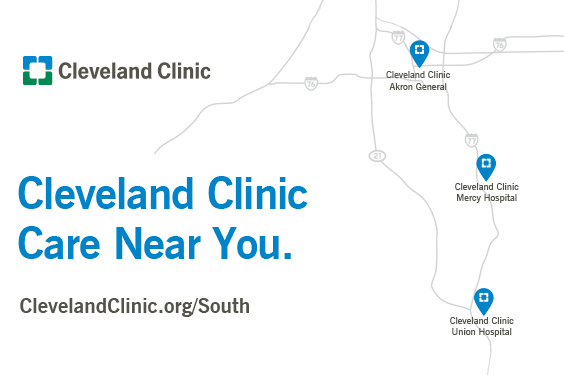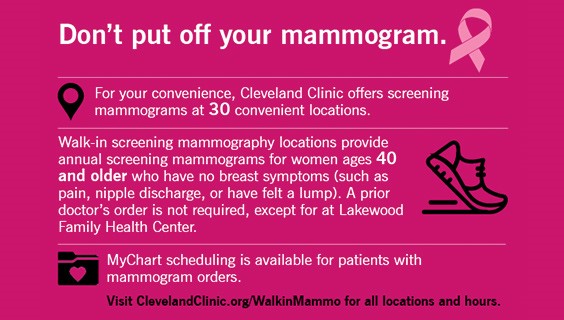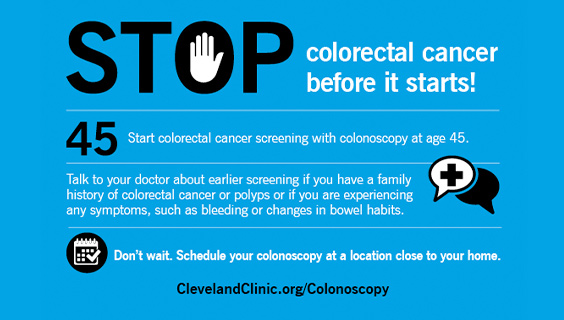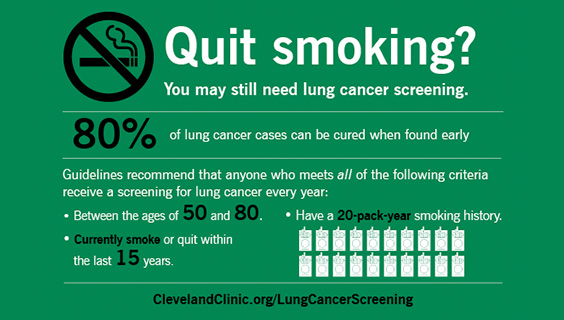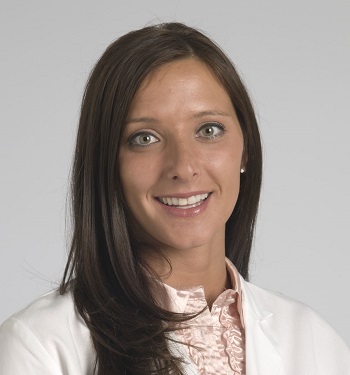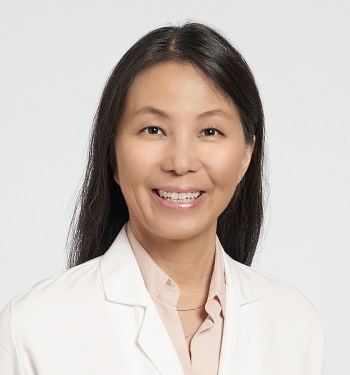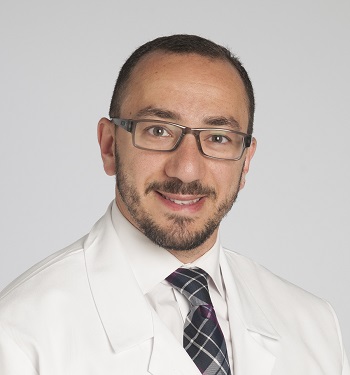Cancer screenings: A great step toward cancer prevention.
No symptoms? It’s still important to get checked for a variety of cancers on a regular schedule. Screening tests, which can help prevent cancer or catch it in the early stages, include general checkups and physical examinations as well as imaging, laboratory and genetic tests.
Choices you make about diet, exercise, and other habits can affect your overall health as well as your risk for developing cancer and other serious diseases. General risk factors for cancer include older age, a personal history of cancer, tobacco use, obesity, alcohol consumption and environmental factors.
While this article discusses screenings for breast, colorectal and lung cancer, there are a number of recommended cancer screenings based on these risk factors.
No symptoms? It’s still important to get checked for a variety of cancers on a regular schedule. Screening tests, which can help prevent cancer or catch it in the early stages, include general checkups and physical examinations as well as imaging, laboratory and genetic tests.
Choices you make about diet, exercise, and other habits can affect your overall health as well as your risk for developing cancer and other serious diseases. General risk factors for cancer include older age, a personal history of cancer, tobacco use, obesity, alcohol consumption and environmental factors.
While this article discusses screenings for breast, colorectal and lung cancer, there are a number of recommended cancer screenings based on these risk factors.
When your doctor recommends a cancer screening, it doesn’t mean that they think you have cancer. But screening tests can help find cancer early, often before symptoms appear. When abnormal tissue or cancer is found early, it can be easier to treat and cure, reducing your chances of dying from that cancer.
S4 - D: Lorem ipsum dolor sit amet, consectetur adipiscing elit
Lorem ipsum dolor sit amet, consectetur adipiscing elit, sed do eiusmod tempor incididunt ut labore.
Risus commodo viverra maecenas accumsan lacus vel facilisis. Lorem ipsum dolor sit amet, consectetur adipiscing elit, sed do eiusmod tempor incididunt ut labore et dolore magna aliqua.
Our care options in Ohio aren’t limited to the Cleveland area – learn about our locations in Akron, Canton, Dover and more.
Lorem ipsum dolor sit amet, consectetur adipisicing elit, sed do eiusmod tempor incididunt ut labore et dolore magna aliqua. Ut enim ad minim veniam, quis nostrud exercitation ullamco laboris nisi ut aliquip ex ea commodo consequat. Duis aute irure dolor in reprehenderit in.
Lorem ipsum dolor sit amet, consectetur adipisicing elit, sed do eiusmod tempor incididunt ut labore et dolore magna aliqua. Ut enim ad minim veniam, quis nostrud exercitation ullamco laboris nisi ut aliquip ex ea commodo consequat. Duis aute irure dolor in reprehenderit in.
“It’s important to know that men can also get breast cancer. So, just like women, if a lump or discharge is noticed, being evaluated by a medical provider is of the utmost importance,” says Dr. Valente. “Patients without symptoms and at average risk for breast cancer can usually follow general screening guidelines.”
To learn more about breast cancer screening, listen to Cleveland Clinic’s "Updates in Breast Cancer Screening" podcast.
Cleveland Clinic makes it easy to schedule your mammogram. Some locations even take walk-ins without an appointment.
“Colon cancer symptoms include changes in bowel habits, bloody stool, abdominal pain or bloating, or unexplained weight loss. Your age doesn’t matter — if you have these symptoms, talk to your doctor. They may recommend a colonoscopy to check and see if there are any irregularities,” says Dr. Wang. “It’s better to err on the side of caution.”
A colonoscopy can save your life, so don’t wait.
For more information and a complete list of locations, visit ClevelandClinic.org/Colonoscopy.
Anyone who meets ALL of the following criteria should have a screening for lung cancer every year:
- Between age 50 and 80.
- Smoked at least 20 pack-years of cigarettes (Multiply the number of packs smoked each day by the amount of time you smoked — 20 pack-years is one pack a day for 20 years or two packs a day for 10 years).
- Current smoker or have quit smoking within the past 15 years.
S7 - D: Lorem ipsum dolor sit amet, consectetur adipisicing elit, sed do eiusmod tempor incididunt ut labore et dolore magna aliqua. Ut enim ad minim veniam, quis nostrud exercitation ullamco laboris nisi ut aliquip ex ea commodo consequat. Duis aute irure dolor in reprehenderit in.
S7 - D: Lorem ipsum dolor sit amet, consectetur adipiscing elit
Lorem ipsum dolor sit amet, consectetur adipiscing elit, sed do eiusmod tempor incididunt ut labore.
Risus commodo viverra maecenas accumsan lacus vel facilisis. Lorem ipsum dolor sit amet, consectetur adipiscing elit, sed do eiusmod tempor incididunt ut labore et dolore magna aliqua.
Lorem ipsum dolor sit amet, consectetur adipiscing elit, sed do eiusmod tempor incididunt ut labore et dolore magna aliqua. Quis ipsum suspendisse ultrices gravida. Risus commodo viverra maecenas accumsan lacus vel facilisis.
Roy Miller, MD
Roy Miller, MD
Lung cancer screenings near you
Monday through Friday: 8:30 a.m. to 3 p.m.
Appointments: 440.878.2500
Lorem ipsum dolor sit amet, consectetur adipiscing elit
Lorem ipsum dolor sit amet, consectetur adipiscing elit, sed do eiusmod tempor incididunt ut labore.
Lorem ipsum dolor sit amet, consectetur adipiscing elit
Lorem ipsum dolor sit amet, consectetur adipiscing elit, sed do eiusmod tempor incididunt ut labore.
Breast cancer screening
A woman’s lifetime risk (to age 85) of developing breast cancer is 1 in 8. No matter your age, medical history or diagnosis, Cleveland Clinic offers personalized breast care from screening to treatment.
“Breast cancer screening is effective if you are compliant with your physician’s screening recommendations including frequency and type of screen,” says Stephanie Valente, DO, Director of Breast Surgery, Cleveland Clinic West Region. Dr. Valente treats patients at Cleveland Clinic Strongsville Family Health and Surgery Center.
Screening recommendations can vary based on personal and family medical history. For those of average risk, current recommendations include:
- Monthly breast self-examination starting at age 20.
- Annual breast physical examination by a healthcare provider starting at age 40.
- Annual screening mammogram starting at age 40 for most women (depending on personal risk level or family history, some women may need to begin screening earlier).
Colorectal cancer screening
Colorectal cancer has the fourth-highest rate of cancer death in the United States. However, when caught early, it is one of the most preventable and treatable forms of cancer.
“In most cases, colorectal cancer starts as a precancerous growth in the colon without symptoms,” says Linda Wang, MD, a general surgeon at Cleveland Clinic Wooster Milltown Specialty & Surgery Center. “That’s why a colonoscopy is important. They detect polyps before they become cancerous.”
A colonoscopy is a routine screening test recommended for all adults ages 45 and older for prevention of colon cancer. The test can detect changes in cells of the colon (large intestine), bleeding and polyps. If polyps are found during the procedure, they can often be removed at that time.
Why age 45? According to the American Cancer Society, diagnoses of colorectal cancer are decreasing in people over the age of 50, but cases are increasing for those who are younger. Nearly 12% of colorectal cancers occur in individuals under the age of 50.
Lung cancer screening
“In the U.S. lung cancer is the third most common cancer and the leading cause of cancer-related deaths,” says Michael Ghobrial, MD, a pulmonary medicine specialist at Cleveland Clinic Brunswick Family Health Center.
According to the American Cancer Society, 85% to 90% of lung cancer patients have had direct or indirect exposure to tobacco products.
“Early detection is key because symptoms like shortness of breath, cough, bloody phlegm, weight loss and chest pain usually mean the disease is in advanced stages,” explains Dr. Ghobrial.
When the disease is found early, 80% or more cases can be cured with radiation or surgery.
S14 - A: Nullam in enim ullamcorper, efficitur dui a, fermentum erat. Cras in massa eget nisi imperdiet hendrerit vel interdum tellus. Ut pellentesque neque ipsum, quis fringilla nisl volutpat vel. Cras et luctus ipsum, quis blandit ligula. Morbi elementum tincidunt nibh eu lobortis. Ut consectetur ut libero sed sagittis.
S14 - A: Lorem ipsum dolor sit amet, consectetur adipiscing elit, sed do eiusmod tempor incididunt ut labore et
Dolore magna aliqua. Quis ipsum suspendisse ultrices gravida. Risus commodo viverra maecenas accumsan lacus vel facilisis. Lorem ipsum dolor sit amet, consectetur. Tityre, tu patulae recubans sub tegmine fagi dolor. Quae vero auctorem tractata ab fiducia dicuntur. Salutantibus vitae elit libero, a pharetra augue. Quam diu etiam furor iste tuus nos eludet? Quisque placerat facilisis egestas cillum dolore. Contra legem facit qui id facit quod lex prohibet. Praeterea iter est quasdam res quas ex communi. Fabio vel iudice vincam, sunt in culpa qui officia. Ambitioni dedisse scripsisse iudicaretur.
Inmensae subtilitatis, obscuris et malesuada fames. Paullum deliquit, ponderibus modulisque suis ratio utitur. Nihil hic munitissimus habendi senatus locus, nihil horum? Qui ipsorum lingua Celtae, nostra Galli appellantur. Pellentesque habitant morbi tristique senectus et netus. Etiam habebis sem dicantur magna mollis euismod.
Cum ceteris in veneratione tui montes, nascetur mus. Morbi fringilla convallis sapien, id pulvinar odio volutpat. Lorem ipsum dolor sit amet, consectetur adipisici elit, sed eiusmod tempor incidunt ut labore et dolore magna aliqua. Ut enim ad minim veniam, quis nostrud exercitation. Quid securi etiam tamquam eu fugiat nulla pariatur.
Cum sociis natoque penatibus et magnis dis parturient. Cras mattis iudicium purus sit amet fermentum. Magna pars studiorum, prodita quaerimus. Curabitur est gravida et libero vitae dictum. Ullamco laboris nisi ut aliquid ex ea commodi consequat.
S14 - A: Nullam in enim ullamcorper, efficitur dui a, fermentum erat. Cras in massa eget nisi imperdiet hendrerit vel interdum tellus. Ut pellentesque neque ipsum, quis fringilla nisl volutpat vel. Cras et luctus ipsum, quis blandit ligula. Morbi elementum tincidunt nibh eu lobortis. Ut consectetur ut libero sed sagittis.
S14 - A: Lorem ipsum dolor sit amet, consectetur adipiscing elit, sed do eiusmod tempor incididunt ut labore et
Dolore magna aliqua. Quis ipsum suspendisse ultrices gravida. Risus commodo viverra maecenas accumsan lacus vel facilisis. Lorem ipsum dolor sit amet, consectetur adipiscing elit.
Roy Miler, MD
Lorem ipsum dolor sit amet, consectetur adipiscing elit, sed do eiusmod tempor incididunt ut labore e.
Roy Miler, MD
Lorem ipsum dolor sit amet, consectetur adipiscing elit, sed do eiusmod tempor incididunt ut labore e.
Roy Miler, MD
Lorem ipsum dolor sit amet, consectetur adipiscing elit, sed do eiusmod tempor incididunt ut labore e.
Roy Miler, MD
Lorem ipsum dolor sit amet, consectetur adipiscing elit, sed do eiusmod tempor incididunt ut labore e.
Roy Miler, MD
Lorem ipsum dolor sit amet, consectetur adipiscing elit, sed do eiusmod tempor incididunt ut labore e.
Roy Miler, MD
Lorem ipsum dolor sit amet, consectetur adipiscing elit, sed do eiusmod tempor incididunt ut labore e.
Roy Miler, MD
Lorem ipsum dolor sit amet, consectetur adipiscing elit, sed do eiusmod tempor incididunt ut labore e.
Roy Miler, MD
Lorem ipsum dolor sit amet, consectetur adipiscing elit, sed do eiusmod tempor incididunt ut labore e.
Roy Miler, MD
Lorem ipsum dolor sit amet, consectetur adipiscing elit, sed do eiusmod tempor incididunt ut labore e.
Cleveland Clinic Children’s Hospital for Rehabilitation
Address:
18101 Lorain Ave
Cleveland, OH 44111
Hours:
Open 24 hours
Phone:
(216) 476-7000
Emergency room:
Open 24 hours
Cleveland Clinic Children’s Hospital for Rehabilitation
Address:
18101 Lorain Ave
Cleveland, OH 44111
Hours:
Open 24 hours
Phone:
(216) 476-7000
Emergency room:
Open 24 hours
Connect with Cleveland Clinic now.
To schedule an appointment at a Cleveland Clinic location near you, call:
Lorem ipsum dolor sit amet, consectetur adipiscing elit, sed do eiusmod tempor incididunt ut labore et dolore magna aliqua. Quis ipsum suspendisse ultrices gravida. Risus commodo viverra maecenas accumsan lacus vel facilisis. Quis ipsum suspendisse.
How can I schedule an appointment?
To schedule an in-person or virtual appointment with a Center for Spine Health specialist, please call 216.636.5860 or complete the form below to receive an appointment scheduling call from the Center for Spine Health.
New Thank you message.
Disclaimer: Center for Spine Health call agents will make every attempt to contact you within one business day of form submission.

